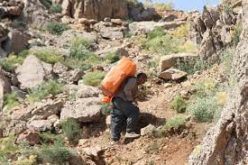Radiofarda – President Hassan Rouhani insists on ending the coronavirus-related restrictions and advocates resumption of economic activities in opposition to the Health Ministry which has kept warning the deadly virus outbreak cannot be controlled without such restrictions.
Critics accuse the administration of putting the economy before people’s health. President Rouhani dismisses this allegation and insists that imposing strict lockdown regulations will harm more people with subsistence problems than coronavirus infection. According to a recent poll by the Iranian Students Polling Agency (ISPA), 70 percent of Tehran residents say they were already not able to cope financially or could only last for a maximum of two months on their savings.
On Sunday Rouhani said traveling within the borders of each province — but not between provinces — was now allowed and that governors of provinces and cities have no authority to impose their own lockdowns.
Speaking at the meeting of the National Coronavirus Management and Combat Taskforce, Rouhani also promised that from April 20 roads connecting provinces will be opened to traffic. He advised people to use private transportation or taxis instead of public transport in larger cities. Deputy Health Minister Iraj Harirchi on April 11, had said more than 25% of all coronavirus victims in Iran contracted the virus in public transport such as buses and the metro.
Rouhani has maintained that the next step will be “smart social distancing”, a plan devised in conformity with “the Iranian lifestyle and domestic patterns” and the principles formulated by the World Health Organization (WHO). Details of the plan have not been revealed yet.
A report published by the Epidemiology Committee of the Health Ministry has predicted that the next wave of infections in Iran may occur in fall and winter and may even be stronger than the current wave.
The report predicted that if Iran reached the peak in early April, the death toll until mid-June could reach 16,000 while if the peak happened in early May as a result of relaxing the current social distancing regulations, as many as 30,000 could die by mid-June.
Speaking to the state-run Television on April 11, the Planning Deputy of the Coronavirus Combat Taskforce of Tehran said the Rouhani government has been vacillating between two different approaches against the spread of the virus, one of herd (mass) immunity and the other of implementing lockdowns.SEE ALSO:Escalation Of Coronavirus Crisis In Tehran, As Officials Withhold Death Toll
“There is no middle path,” Dr. Ali Maher said. The first will result in many deaths, including those who make up the workforce of the country, while the second – meaning strict lockdown for between 14 to 20 days when at least 80% of the population stays home — will help identify all infection cases and control the situation.
The problem is that the Iranian government lacks the authority to impose a full lockdown and a unified policy does not exist, the Coronavirus Combat Taskforce Deputy said.
In an Instagram post on Sunday, March 29, the Spokesman of the President’s Science and Technology Deputy, Parviz Karami, said that with no government intervention at all, coronavirus could kill at least 11,000 Iranians until mid-July.
According to a model that Karami quoted, if the government keeps its intervention to a minimum level the death toll will be at around 33,000 while if it intervenes at an intermediate level — that is if it enforces social distancing, closure of sports, cultural and religious events, universities and schools, and the restriction of human mobility — the figure maybe around 11,000.
On Sunday the Chairman of Tehran City Council warned that opening businesses will result in a second wave of the pandemic in the capital Tehran, a city of 8.7 million. Mohsen Hashemi was referring to the decision to go back to normal business next week. Government offices have already opened but have limited the presence of the staff to two-thirds.
Iran announced its first coronavirus cases on February 19 and has officially announced a death toll of 4,474 and a total of 71,686 as of April 12.
- Maryam SinaieeMaryam Sinaiee is a British-Iranian journalist, political analyst and former correspondent of The National, who contributes to Radio Farda.
 Shabtabnews In this dark night, I have lost my way – Arise from a corner, oh you the star of guidance.
Shabtabnews In this dark night, I have lost my way – Arise from a corner, oh you the star of guidance.


